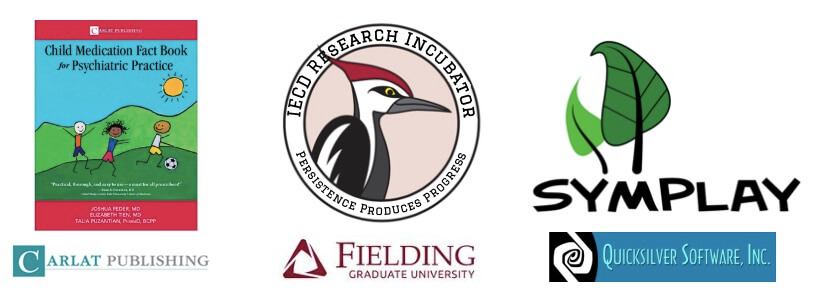Returning this week as our guest is Dr. Joshua Feder, a child and family psychiatrist in Solana Beach, California using the Developmental, Individual differences, Relationship-based (DIR) model. One of my biggest revelations from being a Floortime parent that I presented at the DIR/Floortime Conference in November was that parents ‘accept reality’. This week, Dr. Feder and I discuss why it is so important to emphasize that accepting reality is a process that parents need to be supported in, and the ways in which we can do this.

Supporting Parents in the Process of Accepting Reality
Dr. Joshua Feder Editor in chief at the Carlat child psychiatry report, and an advocate with the DIR Coalition of California.
He is a faculty member with both the International Council on Development and Learning (ICDL) and Profectum, and an adjunct faculty with Fielding Graduate University in the Child and Infant Development PhD program where he also heads up the Infant and Early Childhood Development Research Incubator. His latest role is the Medical Director of Positive Development.
For many years people have struggled to get funding for DIR/Floortime. Dr. Feder has worked with colleagues in advocacy to fight for legislature to give the right to families to receive all evidence-based care.
Positive Development works with the insurance companies on a national level, demonstrating that research is pointing towards developmental approaches where the treatment model uses a multidisciplinary team and family-mediated model.
Piggybacking off the Real Connections model, they are bringing this throughout the country starting first in Florida and New Jersey.
What Did I Mean by ‘Accepting Reality’?
When I gave the revelation of ‘accepting reality’ as important to moving forward with our parenting of an autistic child, I was coming from being in this cloud of confusion after my son’s brain inflammation, going through rehab, getting an autism diagnosis, and that intense focus that parents face of the ‘must fix now’ mindset where we think we need to ‘get back on track’ and ‘catch up’ our children before they get to Kindergarten. I was talking about getting to the place of accepting our reality of our child being on a different path–one in which my child is neurodiverse.
As Jackie Bartell pointed out in our podcast about my presentation, ‘accepting reality’ is a process. It takes time to accept reality. I even stated it took me about four years. This process for parents often involves grief that is our own, not our child’s, and Dr. Robert Naseef discussed this with me in a past podcast. Dr. Feder wanted to discuss how we manage ‘accepting reality’ in a manner that is supportive, while recognizing the never-ending, always changing little grief reactions that we experience as life unfolds, despite our need to love the child we have.
‘Accepting Reality’ can be a Touchy Subject
Dr. Feder teaches about the process of accepting reality in a variety of settings, including in peace building with young children in conflict zones who are under distress. The core of the Developmental, Individual differences, Relationship-based (DIR) Model for him is reflective practice, where we take time to think and work together to problem-solve, come back, try ideas, and then do that with others too. Rather than telling others what to do, DIR practitioners help others develop their own confidence to have the competence to work with their own child–whether they are a parent, teacher, or practitioner.
Dr. Feder shared with us his do’s and don’ts of reflective practice with this graphic novella, below. One woman says to the other “Face it” (‘accept reality’), but this is what not to do because when you’re just figuring out that you’re in a different place, telling someone “you need to face what’s going on” isn’t going to help them. It’s a process, and in many cases a lifelong process. When you ‘rub it in’ like that it’s very dysregulating, Dr. Feder explains. But people do this all the time thinking that the best thing they can do to help a family is to show a harsh mirror in their face. It is not helpful.

We do need to get to a place where we understand that we are at a different place than we expected. Many of us have seen the Welcome to Holland poem where you plan for a trip to Italy then find you’ve landed in Holland instead. But Dr. Feder points out that actually, when things happen the way you expect, it’s kind of the exception to the rule! We can be upset when things don’t go as we expect, unless we understand that nothing goes how we expect! It becomes like a game in a way. Then we can instead think, “How is this different and what do I want to do about it?“
On the one hand, while facing reality is critical, it is not immediate. If we’re going to be great developmental people, we need to lead with empathy. And although I wish I’d have accepted my own family’s reality sooner, but maybe it wasn’t possible. The process was essential to coming to a place of acceptance.
Accepting reality as an Autistic
Accepting reality includes symbolic thinking that can include different labels that we use, Dr. Feder shares. We hear people say, “He’s an autistic…,” or “I have a 10-year-old autistic,” and this lead us into person-first language, Dr. Feder continues. Then the Autistic Self-Advocacy Network (ASAN) brought up that they prefer ‘autistic’ rather than ‘person with autism’. It is about identity. Dr. Feder’s son hated being called autistic growing up. He wanted people to think of him as him, not about an autistic kid because he was worried about discrimination. It’s different for everyone.
Accepting reality can apply in job interviews too, which Dr. Feder explains can be hard for individuals on the spectrum if they come across as a bit different. Accepting who you are and having a way of talking about it that you are comfortable with can really be helpful, he explains. They say the interviewer has, “Would I go out with this person for a beer?” in their head. Just by saying something right at the start like, “I’m more of a science guy…” changes the narrative immediately with the reality. This can remove that wondering of going out for a beer, making it more about the job, Dr. Feder offers.
“I understand”
Another thing not to do when someone is in the process of ‘accepting reality’ is to say, “I understand“, Dr. Feder states. No, you don’t. A lot of marketing people claim that telling someone that you understand helps them know you care, are thinking about them, and empathize which creates better understanding between you two. But Dr. Feder says that the quote from Tolstoy’s Anna Karenina rings true here, that “All happy families are alike; each unhappy family is unhappy in its own way.” Nobody knows what it’s like for anyone else. We all have different experiences and difficulties. Hearing “I understand” stiffens you up, Dr. Feder asserts.
“That sounds hard…”
So what will work? What is helpful? Dr. Feder offers that if there’s one catch phrase, it’s “That sounds hard…” It’s almost universally helpful, he believes. It makes the person feel understood. Not in the specifics, but generally, he says. This is a key that unlocks a door to problem-solving and to co-regulate and settle things down. It’s respectful, too, I added. It’s respecting the experience of the other person. When it’s a sincere, empathetic expression, “That sounds hard” can be a first step to accepting reality. I gave an example of someone saying, “I’m sorry” to me and how for me, that was my “That sounds hard” which kicked me into facing my own grief.
“That sounds hard” sounds more sincere than “I understand”. It hooks in to where you empathize without trying to be too specific, and the other person feels it.
A Parallel Process
As DIR professionals, we help caregivers support kids but we ourselves do our best when we, too, have people supporting us. This is a parallel reflective process where there is a mentor to the clinician, the clinician to the parent, and the parent to the child. It’s a holding environment for everyone in the system. As such, too, Dr. Feder doesn’t like to ask questions, but make statements like, “I’m not sure what colour you like” versus “What’s your favourite colour?” We don’t direct kids; we don’t direct parents; we don’t direct practitioners.
We take the little sparks that are there and we help them grow into beautiful flames of intent and agency.
Dr. Feder says that if you have only one take-away from this podcast today, it’s to find those places where you have time to think and reflect, brainstorm, not direct others, and regularly problem-solve so you can feel more confident in your competence. This reflective practice is what Dr. Costa and I discussed in our podcast about the process of formation.
The Fruits of Reflective Practice
When you get this kind of support and assistance from somebody in reflective practice, you end up taking a part of them with you, Dr. Feder says. Then, when you’re in a tough spot, when parents are in a tough spot, or when kids are in a tough spot, they can think, “What would my mentor/practitioner/Dad/Mom do?” Dr. Feder gave us a moving example of this happening in his own life recently during the pandemic.
Child mental health leader, Rebecca Shahmoon-Shanok died at the start of Covid in March 2020 and Dr. Feder has since been learning from her in her death. Due to Covid, he was able to attend her online shiva. When Dr. Feder then lost his own father about a month ago, he held a similar online memorial with ideas taken from the shiva he had attended. He said he now carries in him a little of Rebecca and his father, taking their helpfulness, problem-solving, and loving presence with him forward. He says that this is the most beautiful part.
Dr. Feder reminds us that there are always people who care about you and they are there to help you. As Mr. Rogers would say, find the good people. We take these people with us forever and they help us have a better go of struggles in our life. This is a great part of accepting reality, he says. I added that there must be many Floortime practitioners channeling Dr. Stanley Greenspan when they do Floortime!
Our Support Systems
I mentioned actress Isabella Rossellini’s book Some of Me where she mentioned that the voices of her departed loved ones speak to her in her head. Dr. Feder then reminded us of the essay Ghosts in the Nursery by Selma Fraiberg, which Dr. Glovinsky also mentioned in a past podcast. It is about how as parent in the nursery, there are four other people standing there with you–each parent’s set of parents and their influence, in this case negative. Dr. Feder also mentioned Alicia Lieberman‘s Angels in the Nursery where you hold positive experiences from caregivers with you. (Note: Dr. Feder suggests reading Fraiberg’s The Magic Years at least once/year.)
Part of accepting reality is knowing that there are other people who are our healthy supporters. We can go out and find them. They are there. While it’s easy to sometimes focus on the negative, it’s important to focus on the positive and pull ourselves up. Our reality may be that it’s harder for us as a parent, and grief reactions will come up when we see kids doing what our kids may never do, but we can seek out support. Please see our free weekly ICDL parent virtual support meetings.
Self-care
We end today’s podcast with more of Dr. Feder’s graphics. Dr. Feder explains that people who care too much can suffer from ‘compassion fatigue’. If you have a bad situation in your life and you’re not prepared, you get flattened by the wave of emotion. If you see it coming and you try to stop it, you still get flattened. You can’t stop it. Instead, Miller and Sprang suggest that you dive into it. You allow it to bob you up and down, but know it will pass and you will be able to pick yourself up again. More and more, you will get more accustomed to riding the waves so they become less traumatizing and overwhelming.
I’d like to thank Dr. Feder for sharing these helpful thoughts with us and look forward to our next podcast! If you found the information discussed today helpful please do consider sharing this post on Facebook or Twitter. Also, if you have any relevant questions, comments, or experiences to share please consider putting them in the Comments section below.
Until next week… here’s to affecting autism through playful interactions!












This is great. It’s been 2 years since my daughter’s diagnosis, and I find myself still in the acceptance phase at times. I think this article is a great read for extended family members, and am forwarding it on as a great introduction to Affect Autism.
Thanks again for all the work you do!
Thank you, Donna. It is a juggling act of emotions, that is for sure, and a process we all must try to get through to be the positive, supportive, energetic parent our child needs.
Thanks Daria. It’s a great guideline for my own work as a practitioner and as a supervisor for my staff who also work with children and their families.